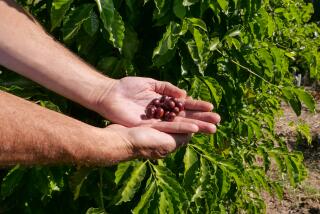Coffee Imports Are a Bitter Cup for Colombia
- Share via
BOGOTA, Colombia — Despite drug cartels, guerrilla movements and financial woes, Colombians could always cling for self-respect to their country’s reputation for abundant, high-quality coffee. At least they could until now.
Two years of deluge have severely damaged the nation’s coffee crop and left warehouses empty. The world’s second-largest producer of java expects to import coffee this year, for the first time in memory.
“This is traumatic, because coffee has always been our pride,” said grower Alberto Gomez. “It has hit us hard to have to import.”
Coffee strikes at the cultural heart of Colombia, where every meeting is preceded and accompanied by a demitasse of tinto, or black coffee. But coffee executives argue that, paradoxically, Colombia must import in order to export and keep its international markets supplied.
Usually, Colombia produces 13 million sacks--about 1.7 billion pounds--of coffee each year, explained Jorge Ramirez, director of restructuring at the Colombian Coffee Federation, the nation’s influential growers organization.
Only beans that meet appearance and flavor standards are exported. That’s why Colombian coffee commands just over a 10% premium on international markets. Beans that fall short are sold domestically at half the price they would command on the world market, a subsidy borne by the growers. Normally, these beans make up less than 10% of the harvest.
But the last two years have not been normal. Heavy rains knocked the delicate white flowers off coffee bushes before they had a chance to produce the bright red berries that cover the coffee bean. The berries that did survive struggled to develop under cloudy skies.
Last year’s 9-million-sack harvest was supplemented with beans stored in warehouses, held back in years when prices were low. Consumers hardly noticed the lower production. With that cushion gone and another 9-million-sack crop pending this year, growers can no longer shield their customers.
“We either have to supply the domestic market at the cost of exports,” said Ramirez, “or we have to import lower-quality coffee.” Besieged by their own problems--including recovery from a major earthquake in January 1999--growers are hardly in a position to forgo export income to sell coffee at subsidized domestic prices.
In addition, part of the premium that Colombian growers receive is for dependability. The poor harvest assures that coffee exports will drop to about 75% or less of their usual level. Minimizing the drop can help growers preserve their reputation, Ramirez said.
Importing cheaper coffee in order to export premium coffee also will lessen the impact on the nation’s already unfavorable balance of trade. Coffee accounts for more than 10% of exports, and a decline makes the nation more dependent on its oil exports.
The imminence of coffee imports makes the rest of the nation more aware of the belt-tightening going on in the mountainous “coffee axle” of western Colombia. The region, historically among the nation’s most prosperous, only recently has diversified its economy to include domestic tourism and additional crops, such as plantains and citrus fruit.
Harvest time usually means a chance for everyone to pay off debts and put a little aside for the coming year. “The great advantage of coffee is that it trickles down and benefits the whole economy,” said grower Gomez. Now that the trickle has slowed to a drip, everyone suffers.
While the weather problems are temporary, said one academician, a deeper concern is that the momentary crisis is distracting from the industry’s structural problems.
“Labor production is low,” said Santiago Montenegro, dean of the economics faculty at Los Andes University here. “That makes production costs per pound too high.”
Colombia must either lower its labor costs or raise prices through a change in marketing strategy, such as supplying the super-high-grade coffee sold in specialty stores.
The Coffee Federation’s Ramirez replied that the U.S. specialty market is less than 1% of Colombia’s normal coffee exports. Instead, he said, Colombia must get through this crisis in a way that will maintain the country’s image as the producer of the best coffee in the world. Even if that means importing coffee.
More to Read
Sign up for Essential California
The most important California stories and recommendations in your inbox every morning.
You may occasionally receive promotional content from the Los Angeles Times.













